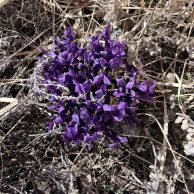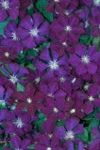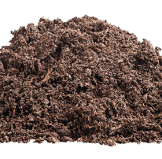 Spring is here and the time is right for dancing in the garden – to stay warm!
Spring is here and the time is right for dancing in the garden – to stay warm!
You can also work up a mild sweat by beginning your spring clean-up. If you have not yet sheared back your cool-season grasses, like Alkali Sacaton, Appalachian Sedge, June Grass, Korean Feather Grass, Karl Foerster’s Feather Reed grass and other Calamagrostis varieties, now is the time. And if you have any Clematis vines that are categorized in Pruning Group 3, February and March are the best times for cutting them back to 1 set of growth nodes above the ground.

Clematis ‘Polish Spirit’
Most of these are the varieties that bloom heavily in early summer and are bred from Clematis viticella or Clematis texensis. If last year’s perennial stalks have fallen over and covered your early-blooming bulbs and other early flowers, you can trim them back, too.
What to do with your new pile of plant debris? Either chop it into small pieces as you go and let them fall and serve as mulch, or shred them with your mower if you still have one, or put them in your compost pile. Or, if you’re lucky enough to live where Curb-side compost pick-up is available, drop the pieces into you city composting bin.
We can be proud that in 2006, in an effort to become a “zero-waste” community, the Boulder City Council adopted the goal to divert 85% of its waste, including yard debris, food, and recyclables, from the landfill by 2017 (later changed to 2025). The plan helped spur the city’s curbside compost collection program, started in 2009. Boulder is almost half way toward meeting its zero-waste goal. According to City data, in 2021 about 44% of the city’s food and other waste was diverted.
But if you live in or around Boulder, be aware of the substantial changes to what is allowed in your curb-side compost container
Big Changes in Curbside Compost Collection for Residents and Business

A1 Compost
Do you have a compost pile or bin at home? How careful are you about what you put in it? Do you take care to remove all the twist-ties, produce labels and any other contaminants, like plastic bags, first? Obviously, these plastic and metal items aren’t going to be broken down anytime soon by soil the microbes and worms, and they will still be there as contaminants when your compost has finished. So you’ll have to pick them out one by one. And if you don’t make your own compost, you would probably be unhappy to pay good money for bags or truckloads of finished compost that had these pieces of trash in them.
Similarly, in large-scale commercial composting operations, the contaminants can be a big, expensive problem for them and for the haulers that bring compostable materials to them. If A1 inspects incoming loads brought by haulers like Western Disposal and finds contaminants, they will reject them. And that costs the hauler around $200 per truckload to dispose of at the landfill. This outcome is unsustainable for the haulers.
A1 Organics, the company that recycles waste into compost for Boulder area residents and businesses, announced last week that beginning on April 1, 2023 it will no longer accept many biodegradable products, including paper materials like tissues, paper towels, tea bags, coffee filters, disposable cutlery and take-out boxes, and other items labeled as “compostable”, as part of its latest effort to crack down on contamination. They will only accept food scraps, yard waste, plant trimmings and certain compostable bags.
If your household or business participates in curbside composting in the city of Boulder, you will want to read this recent article from Boulder Reporting Lab.
If you reside in a neighboring community, contact your city or town’s waste disposal service to find out whether the same changes apply to you.
And it’s interesting to note that A1 Organics is the producer of the highest-rated compost made commercially on the Front Range, called A-1 Eco Grow, one of Harlequin’s Gardens favorite and top-selling composts.
